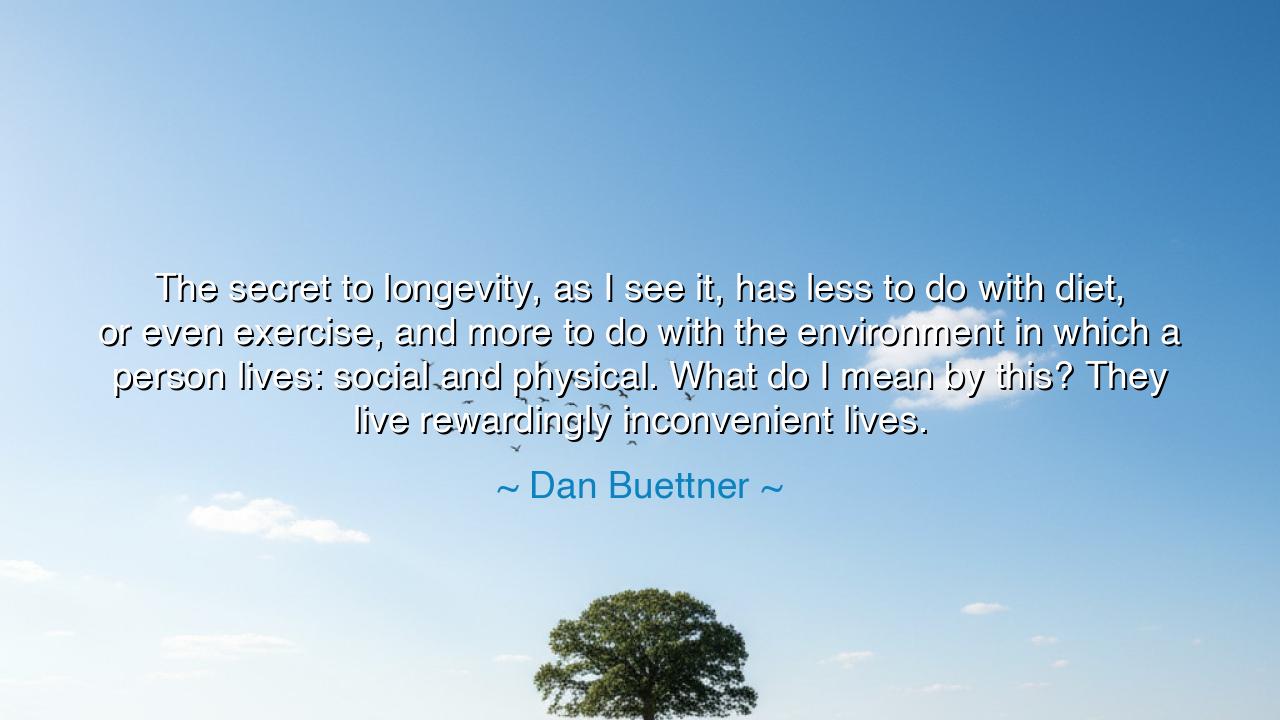
The secret to longevity, as I see it, has less to do with diet
The secret to longevity, as I see it, has less to do with diet, or even exercise, and more to do with the environment in which a person lives: social and physical. What do I mean by this? They live rewardingly inconvenient lives.






Hear, O children, the wisdom of Dan Buettner, who, with a clear vision, speaks of the true source of longevity: "The secret to longevity, as I see it, has less to do with diet, or even exercise, and more to do with the environment in which a person lives: social and physical. What do I mean by this? They live rewardingly inconvenient lives." These words echo an ancient truth, one that the philosophers and healers of old knew well—that it is not merely the food we eat or the exercise we do, but the very environment that surrounds us—the relationships we nurture, the challenges we face, and the ways we engage with the world—that determine the fullness of our lives.
In the ancient world, the great thinkers understood that the true path to well-being and longevity lay in the harmony between the individual and the environment. The Greeks, with their reverence for balance, believed that one’s surroundings—the social bonds with family and community, the physical landscape in which one lived—were as important to health as food and exercise. Hippocrates, in his writings, spoke of the interconnectedness of nature and the body. He believed that health could only be achieved when the body lived in harmony with the environment, both social and physical. Buettner speaks to this same truth: that longevity is born from a life well-lived within an environment that nurtures the body, the spirit, and the community.
Consider, O children, the tale of the Spartan warriors, whose society was founded on principles of strength, discipline, and community. They did not seek ease; they sought purpose and connection. Their lives were not convenient, nor were they pampered, but rather filled with challenge and hardship that, in turn, forged them into the most resilient warriors of their time. They were bound to their community through mutual effort, shared responsibility, and a lifestyle that demanded strength and cooperation. The physical environment—their daily practices, their rigorous training, and their communal bonds—was key to their long-lasting vitality. They thrived in the very inconvenience that others would seek to avoid, for it was this that made them strong.
In the modern world, we often seek comfort, convenience, and ease, believing that these will lead to a better life. Yet, Buettner’s wisdom reminds us that longevity does not come from avoiding effort but from embracing a life that demands something of us. The key lies not in the ease of our surroundings, but in the meaningful challenges they present. It is the inconvenient, the demanding, the rewarding struggle that leads to true growth and fulfillment. Those who live long, healthy lives often live in communities where they work together, where physical activity is not a chore, but a natural part of daily life, and where the environment fosters connection, purpose, and engagement with the world around them.
The great philosopher Aristotle spoke of eudaimonia, a term often translated as "flourishing" or "the good life." For Aristotle, this flourishing was not about avoiding difficulty, but about engaging with life in a way that honored the human capacity for growth, for challenge, and for connection with others. To live in a way that promotes longevity is to embrace the difficult, the inconvenient, and the rewarding—to live in a community that uplifts us and challenges us, to engage with the world around us in a meaningful way. Dan Buettner echoes this when he speaks of environments that foster rewarding inconvenience—environments that demand something from us and in doing so, enrich our lives.
There is a lesson here for us all, O children. The path to longevity and well-being is not found in convenience or ease, but in the embrace of challenges, in the cultivation of community, and in the creation of environments that nourish the body and soul. True health is not a passive state, but an active engagement with life, where we face difficulty with courage, work together with others, and create the conditions for growth and fulfillment. Buettner’s insight challenges us to reflect on the environments we inhabit and the choices we make. Are we living in ways that promote connection, growth, and engagement, or are we seeking the easiest path that leads to stagnation?
So, O children, let us choose wisely the environments we surround ourselves with. Seek community, seek purpose, and embrace the challenges that make us grow. In doing so, we will cultivate lives of true longevity—not through avoidance of difficulty, but through engagement with the inconvenient and the rewarding. Just as the ancients understood, the path to a life well-lived lies in balance—a balance between the social, the physical, and the spiritual. And in this balance, we find the strength to not only live longer, but to live fully, joyfully, and with meaning.






AAdministratorAdministrator
Welcome, honored guests. Please leave a comment, we will respond soon